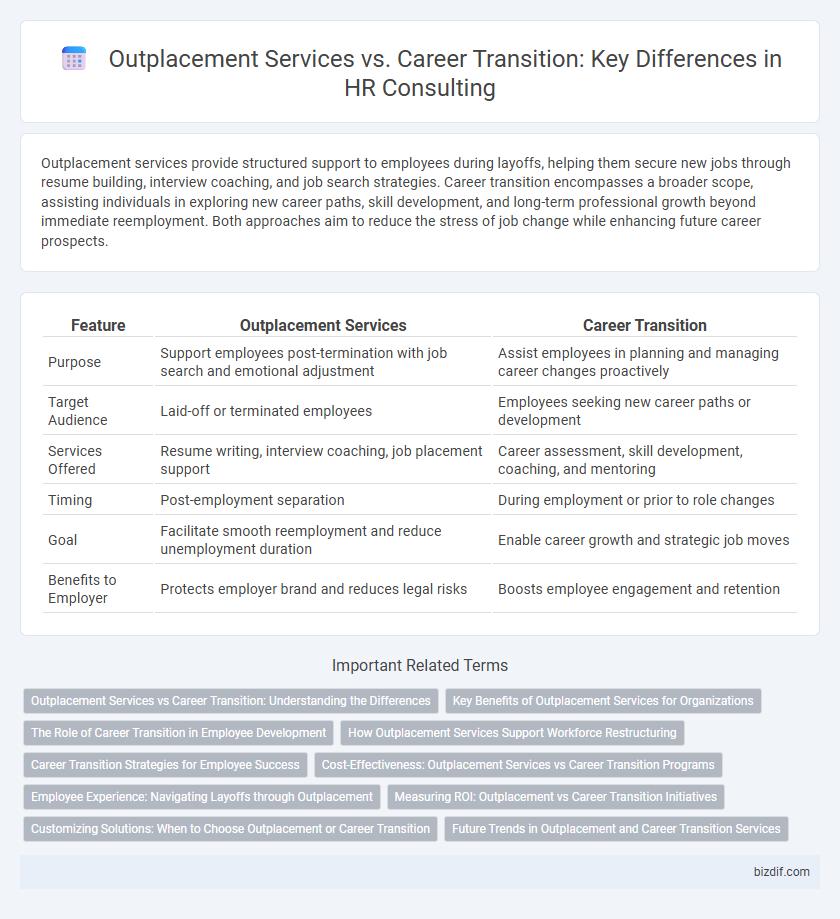Outplacement services provide structured support to employees during layoffs, helping them secure new jobs through resume building, interview coaching, and job search strategies. Career transition encompasses a broader scope, assisting individuals in exploring new career paths, skill development, and long-term professional growth beyond immediate reemployment. Both approaches aim to reduce the stress of job change while enhancing future career prospects.
Table of Comparison
| Feature | Outplacement Services | Career Transition |
|---|---|---|
| Purpose | Support employees post-termination with job search and emotional adjustment | Assist employees in planning and managing career changes proactively |
| Target Audience | Laid-off or terminated employees | Employees seeking new career paths or development |
| Services Offered | Resume writing, interview coaching, job placement support | Career assessment, skill development, coaching, and mentoring |
| Timing | Post-employment separation | During employment or prior to role changes |
| Goal | Facilitate smooth reemployment and reduce unemployment duration | Enable career growth and strategic job moves |
| Benefits to Employer | Protects employer brand and reduces legal risks | Boosts employee engagement and retention |
Outplacement Services vs Career Transition: Understanding the Differences
Outplacement services provide structured support to employees during layoffs, including resume writing, interview preparation, and job search assistance, aiming to facilitate a smooth exit from an organization. Career transition programs encompass a broader scope, helping individuals identify new career paths, develop skills, and adapt to long-term professional changes beyond immediate job loss. Understanding these differences allows HR professionals to select tailored solutions that best support employee tenure changes and organizational workforce strategies.
Key Benefits of Outplacement Services for Organizations
Outplacement services provide organizations with structured support to effectively manage workforce reductions while maintaining employer brand reputation and reducing legal risks. These services enhance employee morale by offering personalized career coaching, resume development, and job search assistance, leading to quicker reemployment and decreased unemployment costs. Implementing outplacement solutions demonstrates corporate responsibility, helping to sustain positive stakeholder relationships during organizational change.
The Role of Career Transition in Employee Development
Career transition plays a crucial role in employee development by equipping individuals with the skills and strategies necessary to navigate job market changes effectively. Outplacement services support this process by offering personalized coaching, resume building, and interview preparation that align with evolving career goals. Emphasizing career transition enables companies to foster resilience, enhance employee confidence, and maintain productivity during workforce changes.
How Outplacement Services Support Workforce Restructuring
Outplacement services provide structured support during workforce restructuring by offering personalized career coaching, resume development, and job search assistance to displaced employees. These services facilitate a smoother transition, reducing downtime and maintaining company reputation by demonstrating commitment to employee well-being. Leveraging skilled outplacement firms can enhance organizational agility and mitigate risks associated with layoffs and downsizing.
Career Transition Strategies for Employee Success
Career transition strategies focus on empowering employees with tailored coaching, skill assessments, and personalized development plans to facilitate smooth job changes and long-term career growth. Through targeted workshops and one-on-one support, employees enhance their marketability and resilience in dynamic job markets. These strategies prioritize employee success by addressing individual strengths and aligning career goals with emerging industry opportunities.
Cost-Effectiveness: Outplacement Services vs Career Transition Programs
Outplacement services typically offer a more cost-effective solution for companies aiming to support departing employees by providing structured job search assistance and emotional support, reducing legal risks and enhancing employer brand reputation. Career transition programs, while often more comprehensive and tailored, tend to incur higher costs due to personalized coaching, skill assessments, and long-term career planning resources. Evaluating the balance between immediate budget constraints and the value of extended support is crucial for HR leaders when choosing between outplacement services and career transition programs.
Employee Experience: Navigating Layoffs through Outplacement
Outplacement services enhance employee experience by providing personalized career transition support, including resume building, interview coaching, and job search assistance, which alleviate the stress of layoffs. Career transition programs offer a broader scope, addressing emotional resilience and skills development to empower employees beyond job placement. Prioritizing tailored outplacement ensures smoother transitions and preserves employer brand reputation during organizational changes.
Measuring ROI: Outplacement vs Career Transition Initiatives
Measuring ROI in outplacement services involves tracking employee re-employment rates, time to secure new positions, and employer brand retention, providing tangible data on program effectiveness. Career transition initiatives focus on long-term career development outcomes and skill enhancement, which are more qualitative and require extended evaluation periods. Comparing these metrics helps HR consulting firms optimize strategies for reducing layoffs' impact and supporting workforce resilience.
Customizing Solutions: When to Choose Outplacement or Career Transition
Outplacement services provide tailored support to employees facing layoffs, focusing on job search strategies, resume building, and interview preparation to ensure smooth exits. Career transition programs offer broader, customizable solutions for individuals seeking new career paths, including skills assessments, coaching, and ongoing development tailored to long-term goals. Organizations should choose outplacement for immediate workforce reductions and career transition services when prioritizing personalized growth and sustainable career progression.
Future Trends in Outplacement and Career Transition Services
Future trends in outplacement and career transition services emphasize personalized digital platforms using AI-driven assessments to tailor job matching and skill development. Integration of virtual coaching and real-time labor market analytics enhances candidate adaptability and employer efficiency. Increasing demand for holistic support including mental health resources highlights the shift towards comprehensive employee re-engagement strategies.
Outplacement services vs career transition Infographic

 bizdif.com
bizdif.com